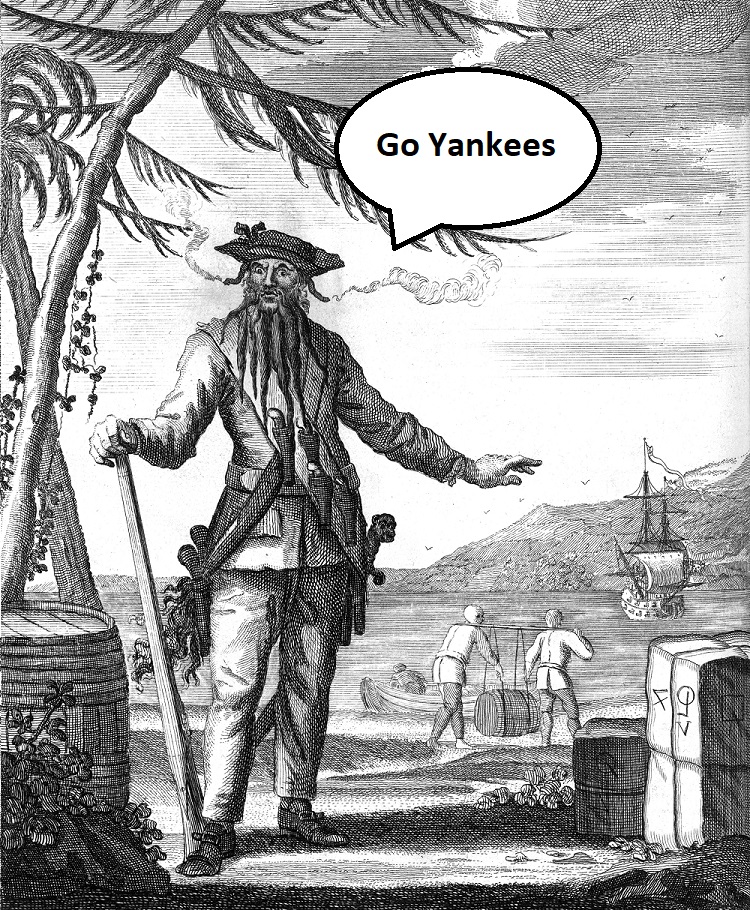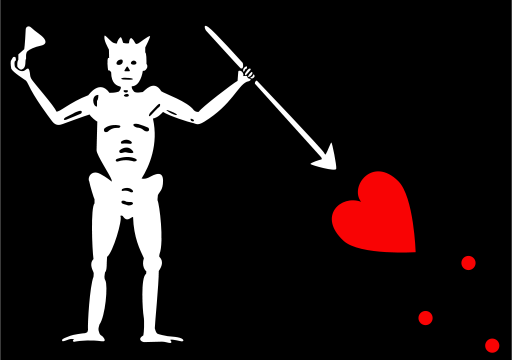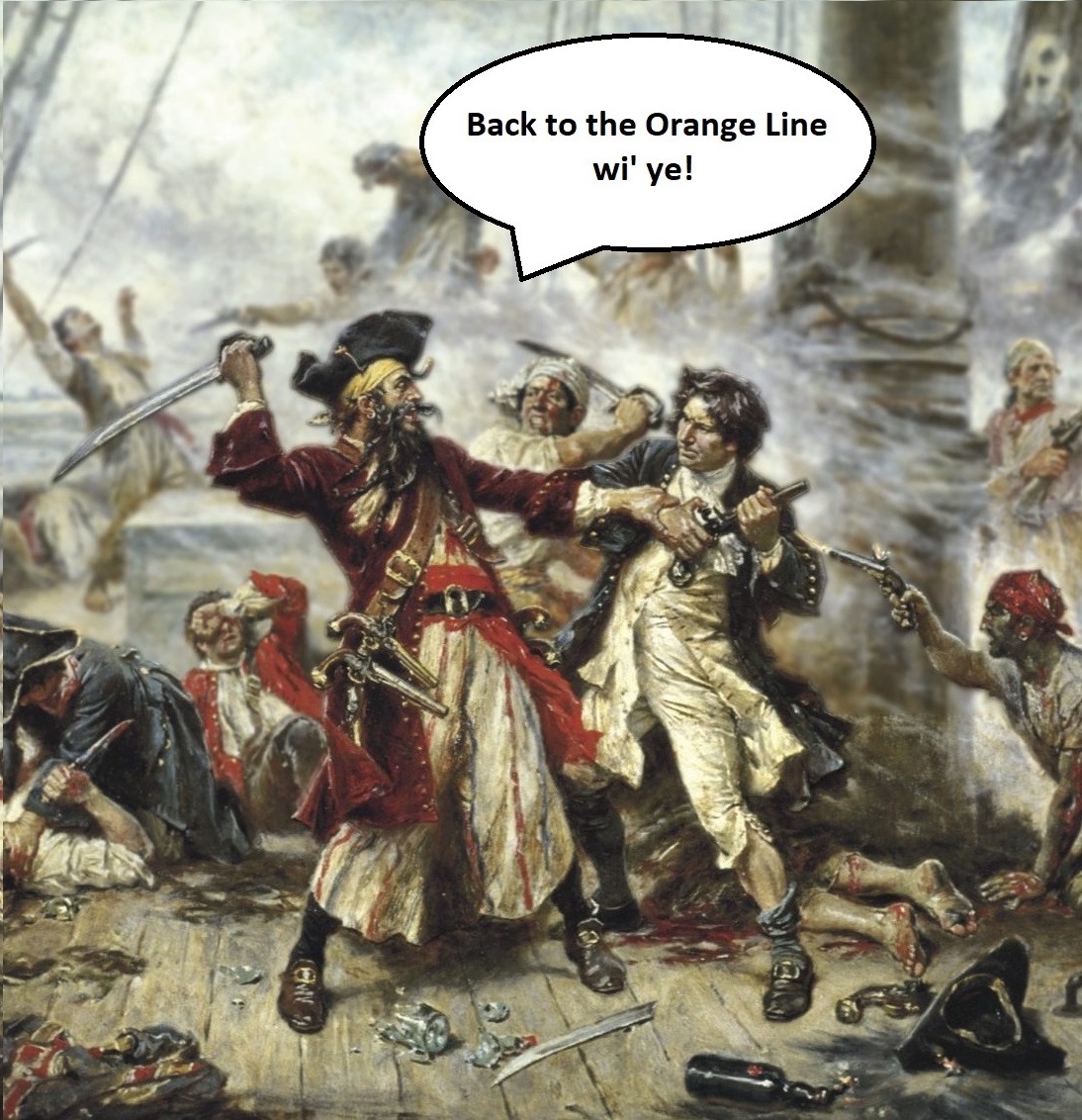Hookbook: Profiles of Ye Olde Pyrates
Blackbeard
actual name:...er, it's in dispute, tbh



The Big Kahuna, the rockstar of the Golden Age of Piracy, this guy is probably the first name the average person will rattle off nowadays when you ask them to name historical pirates. The irony is that for someone who cultivated such a status of legendry, we're not even sure what his name actually was. Woodard thinks he was a member of a middle-class merchant family in Bristol, who, after going to sea, might have taken on a fake name to protect his actual family's reputation. There are a couple ways his name could have been spelled, and "Edward Teach"--or Thatch, or whatever--might have been completely made up anyway. For this reason, I'm going to just refer to the guy as Blackbeard.
So the elephant in the room: the HBO Max show, Our Flag Means Death. Showrunner David Jenkins and the creative team have all made clear, forcefully and repeatedly in interviews, that they only used history as a jumping-off point for inspiration, and are very decidedly departing from historical truth or accuracy with the writing of the show.
History--or at least the popular imagination--likes to portray Blackbeard as a wild-eyed savage, an unlettered barbarian who revelled in blood in violence. And that's probably the image he would have wanted you to have.
There are several contenders for who the person who chose a life of piracy under the nomme de guerre Blackbeard might have been, but Woodard thinks a family of middle-class merchants named Thatch in Bristol produced a son named Edward in about 1680 who might have been Person of Interest Numero Uno. If this is the case, Edward Thatch would have had an education, and thus been literate and taught adequate math for daily use. We know Blackbeard actually kept a journal, because fragments have survived as quotations in other sources, although as most seriously cool reading material is, it has been lost to history, so we don't know if he was actually writing "Mr. Edward Bonnet 💗 Mr. Edward Bonnet 💖 Mr. Edward Bonnet" over and over again in pink sparkly gel pens or not.
His motivations for going to sea or turning pirate aren't clear, but Lehr notes /**(blah blah blah once you've read Lehr fill this in)**/. Woodard also points out the outsized spectre of the recently-ended War of Spanish Succession on sailors and on Englishmen abroad. The War went on for a good 13 years and involved multiple empires, with theatres across the Western Hempishere. We don't know if Thatch went to sea for the sake of the war or ever participated directly in any capacity, but the conflict created lots of opportunity at sea for young Englishmen, and it's possible Thatch started out as a privateer, from which point piracy, once the hostilities ceased, was a natural and frequent outgrowth. England was heavily reliant on privateering as part of it's foreign policy in the New World at this time, and piracy could make an attractive escape from sanctioned but nearly hellish work on merchant or Navy ships, where able-bodied men were often pressed into service against their will and forced to endure miserable conditions with poor pay or payment in IOUs. Pirates lived fast and tended to die within just two or three years of beginning their criminal "careers" (Lehr), but if you were pressed into service aboard a ship that was then raided by pirates, and the pirates offered anyone who wanted to to join their crew, as was common, piracy meant you could keep more of your "output" so to speak, as crews divvied up loot according to a system of shares, as opposed to the salary merchant or Navy sailors were given. Living conditions were likely to be a lot better too, so pressed men could be recruited to pirate ships with the idea that they'd make a quick, sizeable haul and then be able to leave for home with their fortunes made, albeit with the risk that they'd die or be arrested first. This was a foot in the door for several notable pirates of the time, who found that they were quite good at high-seas larceny and decided to stick with it.
So Thatch would have, if the Bristol-born theory is true, been from a port town where trade via sail was a major part of the way of life, and could easily, whether his family were merchants or not, have gone to sea for work, then drifted into piracy via privateering. If he had had direct experience of some kind in the long conflict between nations, whether as a state-backed privateer, a Navy sailor in combat situations, or a civilian somehow caught up in the hemisphere-spanning power-play, it was likely to shape his political views, and possibly even cause trauma related to combat violence or the general chaos of war, which could both have lent themselves to criminality. Any political stances he might have held are hard to pin down, but he did name his ship Queen Anne's Revenge, a nod to the succession of the English throne resulting from the War, and his associates seem to have tended toward Jacobite sympathies, whether the same was true of Thatch himself or not. While The General History of the Pyrates, in its original text, tries to paint the ruffians it profiled as contemptuous of the political orthodoxies of their time, Johan Franzén, in his analysis of the text's historicity, suspects the dialogues it cites, where marine robbers quote arguments from John Locke and try to paint themselves as avenging the common people from the predations of the ruling classes, were really a way for the actual, unknown author(s) of the General History to espouse their own approval of the verboten ideas under the guise of attributing them to ne-er-do-well societal outcasts with which the public were fascinated. So we don't know if any of the words or stances the text attributes to Blackbeard are based in reality, or just a way for "Captain Johnson" to sell the public on the edginess of a leader's right to rule deriving from the consent of the governed versus a monarchy having divine right. That said, being surrounded by the casual mercilessness sanctioned by the empires of this age for the purposes of war, empire-building, or commerce, was surely, by itself, enough to radicalize a person against the established powers.

In Woodard's version of things, Blackbeard was a close friend, possibly going back to their youth, of "Black" Sam Bellamy, who, along with Charles Vane, might have all been from roughly the same area of England and gone to sea at about the same ages. The two of them were taught piracy by Benjamin Hornigold, then the big dog of the Caribbean, until they graduated up to captaining their own ships. Black Sam ended up amassing a fleet of some seriously cool boats that would have taken the eastern seaboard of what is now the United States by storm had not a literal storm--a hurricane in 1716--hit the fleet off the coast of Rhode Island and killed almostt all of the 100+ people onboard the ships, including Sam. Barely 20 people made it to shore, and their numbers kept dwindling as they tried to recover from the storm. Eventually, several survivors tried to head inland to the nearest villages, but they were discovered to be pirates and turned in to the authorities. They were hauled off to Boston and eventually publicly hanged for piracy. Because they had been the last survivors of Bellamy's crew, Blackbeard grew very bitter at Boston for their deaths, hence his grudge. This being said, it is also true that Boston is just a nasty little town full of professional douchebags who revel in being meanspirited and think having an inferiority complex and being too into sports is the same thing as having a culture.
At one point, half the Eastern seaboard was on alert out of concern our boy might actually try to attack the city of Boston. [Fill in] Another incident involved the Revenge (his ship at the time--it was really Stede Bonnet's but it was a nice ship so Blackbeard basically commandeered it and "let Bonnet hang out aboard with them") taking a sloop off the coast of South America. Finding nothing they wanted to steal aboard, Blackbeard assured the captain they weren't going to kill him or any of the crew and would instead just maroon them in an area that was well-trafficked so they'd just have to wait for someone to pick them up. What a nice guy! But since their ship was from Boston, he would unfortunately have to burn it to the sealine with everything in it. Welp, you know how that goes, too bad he doesn't make the rules!
Loyalty seems to have been a defining trait for Blackbeard. On top of his grudge against a whole city for executing the last living associates of his childhood friend, he also had plenty of reason to bail out on or full-out backstab Hornigold a few times, but didn't. As inter-piratical politics in The Bahamas heated up, Hornigold was increasingly seen as the out-of-touch old guard who was going too soft in his old age. Blackbeard seems to have stuck by him even when he might not have agreed with some of his decisions. That said, he did have his drama with Stede Bonnet, and contrary to how the HBO show plays out, Blackbeard was the one who did the double-crossing and bailing out on his foppish protege!
Ah yes, the second elephant in the room: the frenemy drama with Bonnet.(Fill in more once you read more lol)
While Blackbeard today is known as having been particularly bloodthirsty, as well as a keen strategist and tactician who inspired devout loyalty among his crew and landbound admirers, perhaps a better legacy would be his application of what we might now call not so much psychological warfare but public relations or carefully cultivating and leveraging a public image. It is true that he used fear and a reputation for cruelty (probably inflated) to make his work easier, and ships often did surrender without a single shot fired because of it. That's the beauty of a reputation. And he was known to put lit fuses in his beard when he made his entrances, which goes to show you how many people might be deterred from a life of crime by adequately-funded and well-resourced theatre programs in the public schools. Thankfully for those of us living in the 21st century, he never had the opportunity to be an advertising industry executive.

This said, Woodard claims his research does not support the idea of a casual killer who relished cruelty. While the historical Blackbeard was documented to have used violence in interrogating victims and in moments of rage, he does appear to have avoided unnecessary killing. This probably didn't go as far as his fictional counterpart's determination not to kill in Our Flag Means Death, but seems to me to have been a matter of practicality. The simple answer is that dead men tell no tales...ie, if you want a reputation that makes your life of crime easier to accomplish, it actually makes sense to leave plenty of survivors, and to encourage them to spread and embellish--or even make up completely--tales of exaggerated mercilessness. Just like fish tales or tall tales of the American West (or modern-day celebrity encounters), people would happily pass along their stories of their very own near escape from The Dread Pirate Blackbeard, and those would pass along a grapevine, getting attributed to one person and then someone else, a fourth teller of the tale adding in more imagined detail and insisting that no this was his cousin, not some bloke from somewhere else...basically, a game of telephone, just like a middle school rumor mill. Blackbeard basically created conditions for other people to do his promotion for him, and the fact that he's still the most well-known of the pirates of the Golden Age, even though half of it is untrue or exaggerated, is testament to the power of legend and this one person's genius for building a reputation for himself. Other people who were popular legends in his time are completely unknown to us now, but the name Blackbeard is still known...even though his actual name isn't!